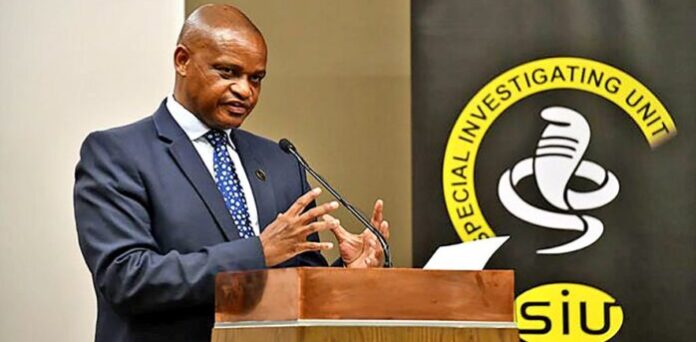The Special Investigating Unit (SIU) has blown the lid on what it calls a devastating plunder of public funds at Tembisa Hospital, with more than R2-billion stolen through corruption and fraud.
SIU head Andy Mothibi revealed the details at a media briefing, where he tabled the explosive interim report that shows how syndicates, crooked officials, and fake suppliers bled the Gauteng health systems dry.
These investigations follow the red flags raised by slain Babita Deokaran on the R850-million corruption at Tembisa Hospital.
“We can reveal today through the SIU investigation that evidence had revealed a number of maladministration, corruption, and other public procurement irregularities. This indeed would be described as devastating plunder of the public funds which we found in our probe,” Mothibi said.
“The investigation has uncovered, up to date, three coordinated syndicates responsible for the loss of over R2-billion.”
He said the review of 2 207 procurement bundles showed serious wrongdoing and fraud.
Corrupt payments
Not only did senior officials from Gauteng’s health department and Tembisa Hospital face accusations, but they also discovered that they had received corrupt payments from service providers.
Evidence also showed these officials were involved in money laundering, fronting, and using fake supply chain documents.
The investigation now covers 207 service providers linked to 4 501 purchase orders at the hospital.
At the centre is the Maumela syndicate, led by businessman Hangwani Morgan Maumela. His network handled contracts worth more than R816-million through 41 linked suppliers.
Maumela’s wealth, according to the SIU, is more than R520-million in assets, including luxury cars and properties valued at R293-million.
These include a R75-million mansion in Bentley Bay, a property in Hartebespoort, two more properties in Zimbali Estate, and other identified properties in Cape Town.
He said Maumela also owns four Lamborghinis valued at R51 749 890, a Bentley valued at 4 199 000, and an Isuzu D-Max valued at 538 600, among others.
Matlala awarded contracts
“The SIU has traced about 41 suppliers or service providers linked to this Maumela syndicate. Three companies linked to Vusumuzi Matlala were awarded contracts worth 13 538 292 in this syndicate.
“This Vusumuzi Matlala would have come in as part of the syndicate that, according to our evidence, is led by Maumela,” said Mothibi.
The SIU has assisted the National Prosecuting Authority’s (NPA) asset forfeiture unit to preserve some of Maumela’s assets, and the Special Tribunal on Monday granted the SIU an order to freeze Maumela’s assets worth R500-million.
Another ring, referred to as syndicate X until the matter reaches the courts, is tied to contracts worth nearly R600-million and assets over R150-million.
He said the investigation has also exposed several smaller syndicates. Syndicate A involves three service providers, with payments of about R9.6-million.
Syndicate B includes six service providers that received over R76-million, while syndicate C consists of five service providers linked to more than R8-million.
Syndicate D involves six service providers with contracts worth over R37-million, syndicate E has four service providers that were paid more than R8-million, and syndicate F includes three service providers connected to one director who received over R28-million.
Government officials paid R122m
Evidence gathered also showed that R122-million was paid directly to officials at Tembisa Hospital and the Gauteng health department.
At least staff members from clerks to managers are implicated in money laundering, corruption, and fraud.
“These individuals abused their positions throughout the procurement process for the benefit of service providers and enrich themselves,” Mothibi said.
The SIU has already prepared 116 disciplinary cases, with 108 handed to the department.
Explaining how they managed to loot the funds, he emphasised that the corruption was not sloppy but carefully organised.
He stated that staff members deliberately split orders to circumvent tender rules, used fraudulent supply chain documents, submitted invoices for the same amounts within hours of each other to conceal their tracks, and laundered money through multiple layers of accounting.
“We have uncovered the extensive corruption. The investigation reveals a pattern of corruption by officials and service providers, significantly undermining the intended purpose of allocated funds,” said Mothibi.
He revealed that even unsuccessful bidders were part of the syndicate as they would gain from the syndicates through payments after the bidding process.
Critical role of small fish
Minister of Health Aaron Motsoaledi stated that corruption was led by junior officials at the hospital, saying the “small fish” are seemingly critical in these syndicates.
During his tenure as minister of home affairs, he recounted a similar situation in which the “small fish” sought the death of a whistleblower who exposed corruption.
He said those involved in these syndicates will be fired and others arrested but raised concerns that people involved in these crimes usually do not stop.
He said someone he knows as a Level 6 worker surprisingly had luxury cars with a garage for each in his Limpopo home, only to discover that he helped rich people get into the country illegally.
“Some might be arrested and sentenced but they are going to get parole and come back and enjoy their Lamborghini’s. They are going to get parole, others are already getting bail,” said Motsoaledi.
He said officials caught in this kind of corruption should be permanently barred from public office, instead of being recycled after disciplinary hearings.
“My desire is that they must never ever see any office that serves the public again,” he said.



